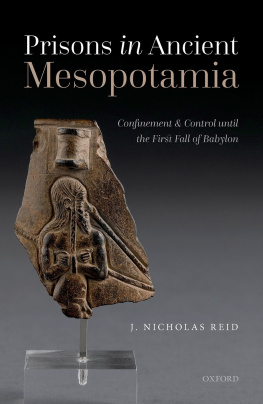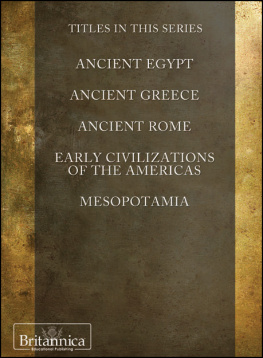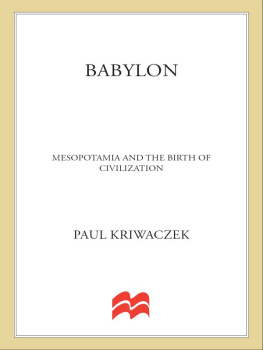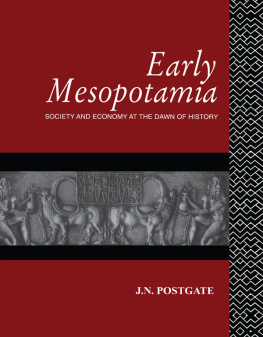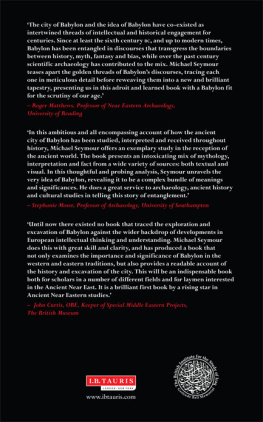J. Nicholas Reid - Prisons in Ancient Mesopotamia: Confinement and Control until the First Fall of Babylon
Here you can read online J. Nicholas Reid - Prisons in Ancient Mesopotamia: Confinement and Control until the First Fall of Babylon full text of the book (entire story) in english for free. Download pdf and epub, get meaning, cover and reviews about this ebook. year: 2022, publisher: OxfordUP, genre: Religion. Description of the work, (preface) as well as reviews are available. Best literature library LitArk.com created for fans of good reading and offers a wide selection of genres:
Romance novel
Science fiction
Adventure
Detective
Science
History
Home and family
Prose
Art
Politics
Computer
Non-fiction
Religion
Business
Children
Humor
Choose a favorite category and find really read worthwhile books. Enjoy immersion in the world of imagination, feel the emotions of the characters or learn something new for yourself, make an fascinating discovery.
- Book:Prisons in Ancient Mesopotamia: Confinement and Control until the First Fall of Babylon
- Author:
- Publisher:OxfordUP
- Genre:
- Year:2022
- Rating:3 / 5
- Favourites:Add to favourites
- Your mark:
- 60
- 1
- 2
- 3
- 4
- 5
Prisons in Ancient Mesopotamia: Confinement and Control until the First Fall of Babylon: summary, description and annotation
We offer to read an annotation, description, summary or preface (depends on what the author of the book "Prisons in Ancient Mesopotamia: Confinement and Control until the First Fall of Babylon" wrote himself). If you haven't found the necessary information about the book — write in the comments, we will try to find it.
J. Nicholas Reid: author's other books
Who wrote Prisons in Ancient Mesopotamia: Confinement and Control until the First Fall of Babylon? Find out the surname, the name of the author of the book and a list of all author's works by series.
Prisons in Ancient Mesopotamia: Confinement and Control until the First Fall of Babylon — read online for free the complete book (whole text) full work
Below is the text of the book, divided by pages. System saving the place of the last page read, allows you to conveniently read the book "Prisons in Ancient Mesopotamia: Confinement and Control until the First Fall of Babylon" online for free, without having to search again every time where you left off. Put a bookmark, and you can go to the page where you finished reading at any time.
Font size:
Interval:
Bookmark:


Great Clarendon Street, Oxford, OX2 6DP, United Kingdom
Oxford University Press is a department of the University of Oxford. It furthers the Universitys objective of excellence in research, scholarship, and education by publishing worldwide. Oxford is a registered trade mark of Oxford University Press in the UK and in certain other countries
J. Nicholas Reid 2022
The moral rights of the author have been asserted
First Edition published in 2022
Impression: 1
All rights reserved. No part of this publication may be reproduced, stored in a retrieval system, or transmitted, in any form or by any means, without the prior permission in writing of Oxford University Press, or as expressly permitted by law, by licence or under terms agreed with the appropriate reprographics rights organization. Enquiries concerning reproduction outside the scope of the above should be sent to the Rights Department, Oxford University Press, at the address above
You must not circulate this work in any other form and you must impose this same condition on any acquirer
Published in the United States of America by Oxford University Press
198 Madison Avenue, New York, NY 10016, United States of America
British Library Cataloguing in Publication Data
Data available
Library of Congress Control Number: 2021951897
ISBN 9780192849618
ebook ISBN 9780192666345
DOI: 10.1093/oso/9780192849618.001.0001
Printed and bound in Great Britain by Clays Ltd, Elcograf S.p.A.
Links to third party websites are provided by Oxford in good faith and for information only. Oxford disclaims any responsibility for the materials contained in any third party website referenced in this work.
To my children, Cooper, Noah, Caleb, and Hannah
(Matt. 9:13a)
This project has been my constant companion for many years now. I began thinking about prisons in ancient Mesopotamia during my doctoral work at the University of Oxford. After defending my dissertation on slavery, I was awarded a fellowship as a Visiting Research Scholar (VRS) at the Institute for the Study of the Ancient World (ISAW), New York University. It was then that I was able to enjoy focused time to work on the project. ISAW has continued to support my research by allowing me to maintain a research affiliation since my time as a VRS. Finally, I have continued working on it while teaching at Reformed Theological Seminary in Orlando (RTSO). I remain grateful to these institutions and the persons affiliated with them for the ways they supported my research.
A few individuals deserve particular mention here. Jacob Dahl, my doctoral supervisor, has supported my research in numerous ways and has remained a mentor and friend through these many years. Thank you.
Betrand Lafont and Vitali Bartash also read earlier drafts of this book. The project is much better because of each of you.
I also owe thanks to the anonymous reviewers. Thank you for giving of your time and for providing invaluable insight into this project.
I have presented on aspects of this research at ISAW, Oxford, and Emory and have also taught two classes on the subject of prisons at RTSO. Thanks to those who invited me to present on my research and to those who took my classes.
As I was working on this project, I published some of the findings with the Journal of Ancient Near Eastern History. I am grateful to the editorial board for accepting that project. Steven Garfinkle shepherded that article through the publication process and taught me a lot along the way.
Several people have also contributed to this volume in other ways. Klaus Wagensonner, who has supported me with friendship, collaboration on other projects, and numerous photos of tablets through the years, allowed me to use some photographs in this volume. Eleanor Robson kindly provided me with permission to use the translation of the Hymn to Nungal included in this volume. Jarett Hall provided me with drawings. Zach Pennington discussed with me the data related to the length of time people spent under guard. He also helped by producing the charts included in this volume to show the findings more clearly. Thanks to each of you.
I would also like to thank Oxford University Press for accepting this project. Working with Charlotte Loveridge, my acquistion editor, has been great.
While I owe each of you a debt of gratitude, I accept full responsibility for any errors that remain.
Finally, I would like to thank Blair, my wife, for her constant friendship and support and for not once asking when I would be done with it. It is to our children that I dedicate this volume. I hope they will grow up to be people who love mercy.
My house gives birth to a just person but exterminates a false one. Since there are pity and tears within its brick walls, and it is built with compassion, it soothes the heart of that person, and refreshes his spirits.
Hymn to Nungal, the prison goddess (lines 1035)
Ancient Mesopotamia is known for being a land of historical firsts. The title of Samuel Kramers book, History Begins at Sumer: Thirty-Nine Firsts in Recorded History, illustrates the point well. While Kramer did not include prisons in his list of firsts, his discussion of another, more benevolent institution can serve as an example of one of the problems with his approach. The initial chapter is entitled, Education: The First Schools. Yet, scribal education in Mesopotamia was not exactly like school as we understand it. Dominique Charpin writes,
The term school appears to be misleading, then, in that it confers an institutional character on the training of scribes. It also suggests a certain continuity of that activity at a single site. The archeological evidence yields a different image: that of houses of literati who trained apprentices at home. All in all, scribal apprenticeships may hardly have been different in their sociological reality from the other ways of transmitting knowledge. That is, they occurred primarily within the context of the family.
Charpin rightly notes that there are a number of ways in which the term school, as we understand it, blurs certain distinctions about Mesopotamian scribal training, which might have been very similar to the transmission of other knowledge such as making pottery. While not strictly a school, at least as we understand them, the Mesopotamian historical phenomenon surely belongs to a history of education and schools, because it serves as an early example of humans passing on the knowledge and the skill of reading and writing from one generation to the next, even if numerous differences exist and a direct linear connection cannot be made.
History should not be restricted to an assessment of our institutions against theirs. This is where Charpins more nuanced approach is valuable. How they educated and passed on the craft of reading and writing is more important than whether or not their schools were like our schools. The same may be said of prisons. And although it will be discovered that imprisonment or detention was multifunctional and only had limited intersection with crime, this work shows how religion, power, and politics can shape ideology attached to very different social-historical realities.
As such, this book is
Font size:
Interval:
Bookmark:
Similar books «Prisons in Ancient Mesopotamia: Confinement and Control until the First Fall of Babylon»
Look at similar books to Prisons in Ancient Mesopotamia: Confinement and Control until the First Fall of Babylon. We have selected literature similar in name and meaning in the hope of providing readers with more options to find new, interesting, not yet read works.
Discussion, reviews of the book Prisons in Ancient Mesopotamia: Confinement and Control until the First Fall of Babylon and just readers' own opinions. Leave your comments, write what you think about the work, its meaning or the main characters. Specify what exactly you liked and what you didn't like, and why you think so.

